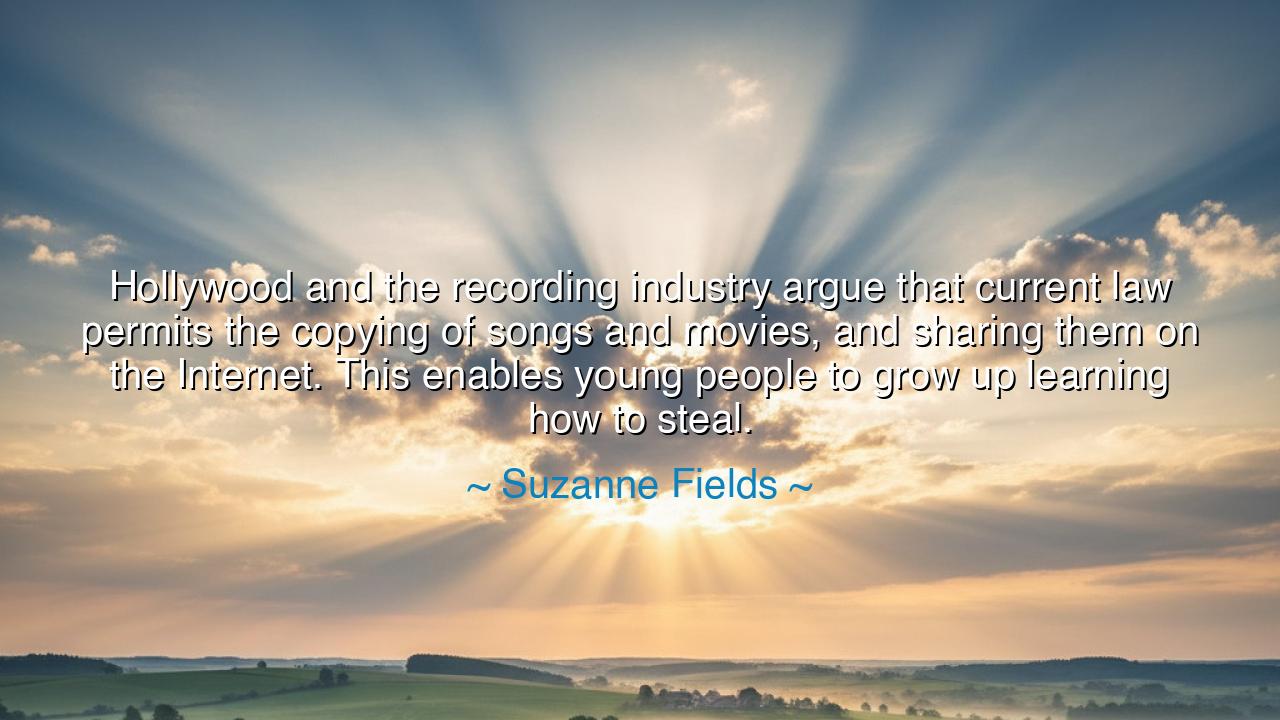
Hollywood and the recording industry argue that current law
Hollywood and the recording industry argue that current law permits the copying of songs and movies, and sharing them on the Internet. This enables young people to grow up learning how to steal.






Hear the stern warning of Suzanne Fields, who looked upon the world of art and commerce in the age of the Internet and declared: “Hollywood and the recording industry argue that current law permits the copying of songs and movies, and sharing them on the Internet. This enables young people to grow up learning how to steal.” In this saying lies a lament not merely for profit lost, but for the moral foundations of a generation. For she speaks not only of films and melodies, but of the slow erosion of conscience when theft is made easy, casual, and hidden behind the veil of technology.
To copy songs and movies without cost may seem harmless to the one who clicks, yet Fields reminds us that each act is not innocent but a theft. The labor of artists, the sweat of musicians, the vision of filmmakers—all are diminished when their creations are taken without honor. Just as the farmer is robbed when his harvest is stolen, so too the artist is robbed when their work is consumed without respect. Fields calls this out with severity: that such acts, repeated and normalized, do not merely harm industries, but teach the young to believe that theft is not theft if it is digital.
History gives us mirrors to this danger. Recall the days of the Roman Empire, when the debasement of coinage was practiced by rulers to mask their greed. To the people, the silver coins looked unchanged, yet their worth was diminished, and soon, the entire economy faltered. So too with piracy: what seems small in one act becomes great in millions, and the value of art is debased until its makers struggle to survive. The lesson is the same: when dishonesty is tolerated in small things, it corrupts the greater whole.
Fields warns also of the young people who grow up in this culture. For what the young learn in habit, they carry into life. If they are trained to think that taking without paying is acceptable, then theft becomes not shameful, but ordinary. Just as a child who grows in war may think violence natural, so a child who grows in digital theft may see honesty as outdated. This is not merely an economic crisis, but a moral one, where entire generations risk losing the clear distinction between right and wrong.
Yet her words are not without hope. For if theft can be taught through culture, so can respect. If the law and society permit dishonor, they can also encourage honor. History again instructs us: when printing presses spread books in the sixteenth century, piracy was rampant. Yet over time, systems of rights and respect for authorship were established, ensuring that those who created were rewarded, and culture itself flourished. What once seemed uncontrollable was tamed by principle and practice. So too may the digital age, if guided by wisdom and justice.
The lesson is radiant: ease of access does not erase responsibility. To take without honoring the labor behind what is taken is still theft, whether it be a loaf of bread or a song. The young must be taught that respect for the work of others is a foundation of society itself. Without this respect, no art can thrive, no commerce can endure, and no culture can remain whole.
Practical action follows. Teach children that the screen does not erase the hand of the artist who created what they see. Support systems that reward creativity fairly. Choose to pay for music, for film, for art, not only for the product itself, but for the value of honesty. And demand of leaders laws that are not only punitive, but also educative, shaping a culture of respect rather than a culture of casual theft.
Thus, Suzanne Fields’s words must be remembered as a call to vigilance: that stealing, even when hidden beneath technology, remains theft, and that what the young learn today will shape the moral world of tomorrow. Let us then guard both art and conscience, that future generations may grow not in the habit of stealing, but in the strength of respect, honor, and truth.






AAdministratorAdministrator
Welcome, honored guests. Please leave a comment, we will respond soon